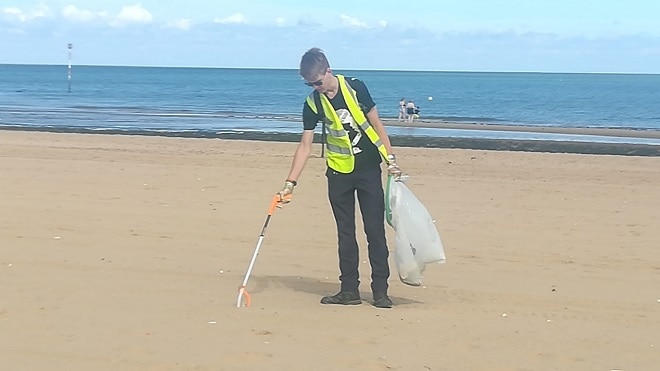
Teenagers taking part in a National Citizen Scheme project have been focusing on mental health within disabilities, homelessness, young people and how to boost positive mental wellbeing.
The teenagers spoke to people living rough and carried out a beach and park clean as part of the social action project.
The NCS helps young people aged 16-17 gain independence, develop skills for their CV, make new friends and participate in something worthwhile and impactful for the community.
For each area of mental health covered the youngsters found a way to raise awareness and support those communities. Some examples include posters placed in shop windows, schools, leisure and youth centres and many more places to spread information concerning mental health of all backgrounds.
Another action undertaken was to clear up the litter at Margate Main Sands and Dane Park, as a cleaner environment is scientifically proven to be key to positive mental health.
To raise awareness for mental health in homelessness, they created a video about the attitudes, sometimes harsh, associated with mental health and homelessness.
They also provided a questionnaire to some of the local homeless community to help them share their story of dealing with mental health.
Asked about the reasons for their subject a team member said: “Mental health is an issue that affects everyone to some extent, no matter the background. We just wanted to do something that could help as many people that are struggling in silence as we can.”
Support can be given with donations to charities such as Young Minds, Porchlight, Mencap and the Salvation Army,
The experience of one woman sleeping rough on Thanet’s streets
Person A: The reason for becoming street homeless is because I was fleeing domestic abuse, I had a difficult home life and my mental health was suffering. I had to choose between living on the streets or finding another partner who I could live with.
Question: What is the most difficult part thing you have to deal with when being homeless?
Person A: I think it’s the lack of women in the homeless community, there’s not many of us and it’s easy for us to be taken advantage of.
Question: Do you think the general public is quick to stereotype the homeless community, if so how?
Person A: Yes, lots of people don’t even give us eye contact. It’s sad because we are only humans too.
Question: How do you access support or manage your mental health on the streets?
Person A: I use the local pub sometimes but it’s difficult to get help when the majority of services are online.
Question: When do you feel the loneliness?
Person A: I definitely feel the loneliness when my mental health is bad, I struggle accessing the right support and it’s difficult sometimes for people to take us seriously.
Question: How do you think being homeless effects your mental health?
Person A: Being a homeless woman, I think my mental health was definitely affected more. I was subject to lots of abuse whilst being on the streets. It was easy for me to sleep with men so I could have warmth and slight protection. The worst part of homelessness for any woman is the lack of sanitary products available, being on your period when homeless is quite possibly the worst.
Question: Do you think more support should be more readily available to you when you are street homeless?
Person A: Yes- whether it is in drop in sessions, facilities to shower in or anything. It is difficult to access support when you are struggling already but it’s harder when you are like this.
Get help
Contact homelessness outreach support team Rise on 01843 577277. Emergency or out of hours: 01843 577000.
Drop-ins: Wednesday 9.30am-noon, Margate Gateway; Tuesday 2pm- 4pm, GAP Baptist Church, Broadstairs.
Email [email protected].
NCS
Each summer NCS, a government funded programme, delivers a programme for 16 and 17 year olds to develop their skills, make new friends and make an impact in their local community. Although the Covid 19 outbreak has meant the full programmes with outdoor activity residentials and stays at university halls to develop life skills have been halted, NCS has created a short 2 week Keep Doing Good Programme.
Keep Doing Good has been an opportunity for smaller groups of young people to take part in skills based activities and donate volunteering hours through designing their own project to benefit their local community.
In Thanet there were two teams of young people who have worked together to create two projects.
Kerry Boyd, NCS Programme Coordinator, said: “The young people have developed so much over such a short amount of time having gone from being a group where nobody knew each other except one or two to come together and bond over their project.
“During their first week, the young people took part in a variety of sessions including debates, community exploration and tackling societal issues.”
Ingeus is the local provider for NCS in the South East. For more information about NCS and the KDG programme please head to https://wearencs.com/keep-doing-good

